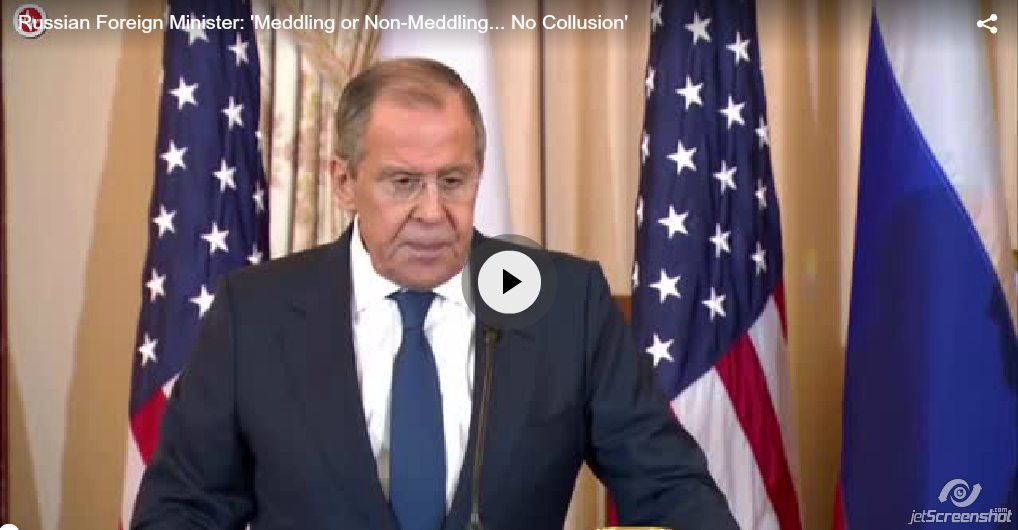
By Polygraph
Sergey Lavrov
Foreign Minister, Russia
“We have highlighted once again that all speculations about our alleged interference in the domestic processes in the United States are baseless. There were no facts that support that. We did not see these facts. No one has given us these proofs because simply they don’t exist.”
Source: C-Span.org, Dec. 10, 2019
False
Multiple reports cite evidence of Russian interference in U.S. politics
On Dec. 10, the Russian Foreign Minister Sergey Lavrov visited Washington, D.C., meeting with the President Donald Trump and Secretary of State Mike Pompeo. Both said later they told Lavrov that Russian interference in U.S. elections was unacceptable and would not be tolerated.
Lavrov and Pompeo held a lengthy news conference after their meeting.
“On the question of interference in our domestic affairs, I was clear: It’s unacceptable and I made our expectations of Russia clear,” Pompeo stated in opening remarks. “The Trump administration will always work to protect the integrity of our elections — period. Should Russia or any foreign actor take steps to undermine our democratic processes we will take action in response.”
Lavrov spent a large portion of his remarks denying any interference.
“We have highlighted once again that all speculations about our alleged interference in the domestic processes in the United States are baseless. There were no facts that support that. We did not see these facts. No one has given us these proofs because simply they don’t exist,” Lavrov said.
Lavrov said Russia has “proposed multiple times” that Moscow and Washington “put on paper” a memorandum of “mutual non-interference in each other’s domestic affairs.”
Pompeo largely deferred to Lavrov when reporters asked questions.
Washington Post correspondent John Hudson brought up the election interference issue. “Why not just read the Mueller report? It is very detailed when it comes to U.S. allegations related to meddling in the 2016 elections,” he asked Lavrov, referring to special counsel Robert Mueller’s nearly two-year investigation into whether the Trump campaign had improperly worked with Russians.
Lavrov responded: “Now as for meddling or non-meddling. You suggested to simply read the Mueller report. We read it. There is no evidence of any collusion.”
Lavrov’s claims that there’s no evidence of Russian interference are false.
In fact, Mueller’s final report rejected the concept of “collusion,” a term not in criminal law, instead examining whether the Trump campaign coordinated or conspired with Russians. The report describes numerous efforts by Russian hackers and others to interfere in the presidential election to Trump’s benefit.
Mueller concluded there wasn’t enough evidence to criminally charge Trump campaign officials for conspiring with Russians. In February 2018, however, Mueller’s team indicted 13 Russian nationals involved in a social media propaganda operation to subvert the election. Also indicted was the Kremlin-backed Internet Research Agency, where many of the indicted individuals worked.
Mueller’s report wasn’t the only investigation of Russian meddling. Others include:
- The FBI counterintelligence investigation code-named “Crossfire Hurricane,” launched July 2016. The details of that investigation were not publicly disclosed; however some clues come from the testimony of former FBI Director James Comey before the Senate Intelligence Committee in August 2017. When asked whether he had “any doubt that Russia attempted to interfere in the 2016 elections” Comey answered “None.” He repeated the same answer when asked about Russian government involvement in the cyber intrusions in the state voter files.
- The Director of National Intelligence’s declassified report in January 2017 found that “Russian President Vladimir Putin ordered an influence campaign in 2016 aimed at the U.S. presidential election” that relied on “third-party intermediaries and paid social media users or ‘trolls.’”
- The Senate Intelligence Committee probe launched in January 2017 found that “in addition to the cyber activity directed at state election infrastructure, Russia undertook a wide variety of intelligence-related activities targeting the U.S. voting process. These activities began at least as early as 2014, continued through Election Day 2016, and included traditional information gathering efforts as well as operations likely aimed at preparing to discredit the integrity of the U.S. voting process and election results.”
- The House Intelligence Committee probe in January 2017 found that: “Russia conducted cyberattacks on U.S. political institutions in 2015-2016. Russian-state actors and third-party intermediaries were responsible the dissemination of documents and communications stolen from U.S. political organizations. Russian intelligence leveraged social media in an attempt to sow social discord and undermine the U.S. electoral process.”
By Polygraph




